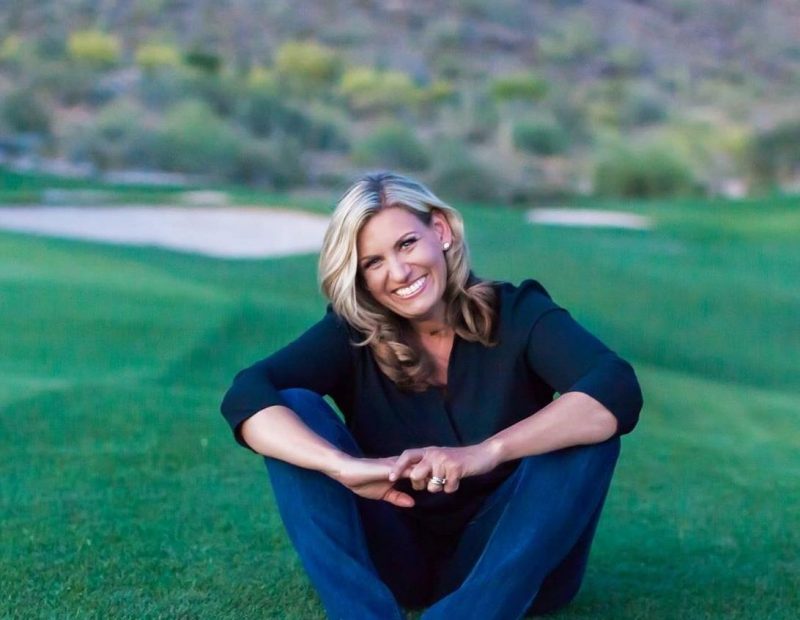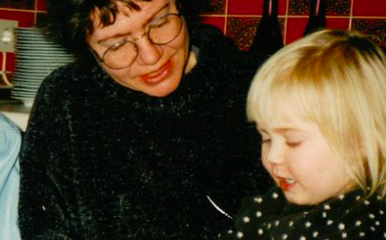by Michelle Steinke-Baumgard
We all have days that define our lives in deeply profound days. For me, there have been just a handful of those days. Like when I graduated with honors from college after struggling with dyslexia and ADHD, the day my children were born, the day I married their father. And of course, the day he died.
A beautiful October morning that started with family, beauty, and promise ended with a phone call while I watched our two-year-old daughter at dance class. There had been a plane crash, and they believed it was our Mitch. As the words came through the phone and I looked on at our daughter, my soul left my body, and I floated above it all, like a horrible dream I just hoped and prayed I would wake up from immediately. I did not have a clue at that moment just how much my life was about to shift and change, how this event would become a forever part of my story, my life, and my future.
I have told my story so many times that I have lost count. Writing articles, my best-selling book Healthy Healing, countless interviews, and spoke on many stages. My tragic story isn’t unlike millions of others; I am not unique; sadly, we all live with loss in this lifetime. We all grieve, experience loss in different ways, and choose a path forward. Some choose to allow their pain to shift them, morph them and change them in ways where beautiful new growth emerges. Some prefer a more painful route full of anger, bitterness, and a victim mentality.
My story resonates with many because while I’ve lived with much pain, I openly validate my grief and remind others it is okay to have their feelings. With that said, I also make the critical choice not to let my loss define the remainder of my future. Yes, it lives with me, it has changed me, and while it informs my future, it will not end my story.
I think how we work through our grief is profoundly essential, and while I’ve made mistakes in that department as well, I believe that choosing a healthy, mindful approach can help us grapple with the hard days and come out fighting stronger on the good days. No, nobody can give you a roadmap for your grief; we are all unique individuals with different paths. With that said, I think the recommendations listed below can help all of us live deeper, impactful, and enriching lives.
#1 – Do not run from the pain
We all want the grief to go away, so we throw ourselves into things that help us become distracted from what is going on inside. Some of these distractions are more toxic at face value (alcohol, drugs). Some of our distractions may appear positive but still allow us to ignore the pain we hold deep down (exercise, travel, overworking, etc.). The truth is the pain won’t just go away because you are distracted. At some point, you will have to face your pain, work through it physically, mentally, and emotionally and come to a place of inner peace. More on that later.
#2 – Don’t disconnect the body from your head when working on healing
When we experience grief, we are encouraged to go into therapy. I am the first to say that traditional therapy is essential and serves a fundamental purpose. Still, we often forget that our body stores trauma too. We need to work on releasing the pain from our nervous system. How? Thankfully we know so much more about how our body stores pain than we did even ten years ago, and there are a lot of forms of somatic — or body therapy.
The easiest way to start is to observe your body and how it feels as you process your grief. Do you notice pain, areas that feel stuck, or discomfort? Drop into your “felt-sense” and become a witness to what your body is telling you. Forms of stretching, trauma, and grief yoga and modalities like TRE (Trauma Releasing Exercises) can work wonders to help you rest and release your pain.

#3 – Get back to nature
I believe that nature is one of our most important healing opportunities. Just by taking a few minutes a day to touch the earth, feel the sun on our face, and take in the clean, fresh air, allows us to reset and gain some strength. Regardless of what we all go through, nature can help us feel connected to something greater and more powerful than ourselves. I think every single grieving person should be prescribed a daily dose of outside time.
#4 – Deep breathing
One of the issues with our grief is it thrusts us into a state of “fight-or-flight,” where we live in a state of survival. Ultimately living from this place is highly stressful and very hard on our body/mind. By focusing on deep breathing, you can take your body out of the sympathetic nervous system (flight-or-flight) and return us to parasympathetic (rest and repair). To start, focus on a deep inhalation (through your nose) where you fill up your diaphragm for a 4-8 second count and a deep exhalation where you focus on exhaling all your stress. Visualize inhaling light and peace exhale the dark and heavy stuff you want to let go of inside. Breathing is a muscle you will have to work to improve, but with enough practice, you will be amazed just how much it can change your life.
#5 – Exercise
Exercise was my go-to form of therapy when I was first widowed. It brought me so much strength, power, and peace. It also allowed me to feel like I could go on another day as a solo mother of two babies. I don’t regret my years of intense exercise; it truly saved my life. Exercise is a beautiful form of therapy, in my opinion. It can give you a place to release your anger, frustration, and yes, even your tears. I’ve cried on long runs, cussed while I lifted heavyweights, and felt cathartic peace at the end of a workout. Do the exercise that speaks to your soul, but remember, movement is a metaphor for life; you put one foot in front of the other and keep moving forward.
#6 – Writing
If you want to know yourself, write. You do not have to be good at it; you don’t have to publish it, post it, or share it. It is just for you, and the more you do it, the more you will grow through your grief. You will start to discover feelings you didn’t realize you had, vulnerabilities from your subconscious mind, pain from your past that you carry into your present and future self, and a deep connection to your inner truth. Start by free-writing, and don’t judge your thoughts, grammar, or intention. Just let whatever needs to flow out of you go, and with that, see your heart start to mend.
 I could go on and on with healthy forms of healing after profound and devastating loss. Topics like meditation, witnessing our thoughts, gratitude, and many more are near and dear to my heart. No step is too small, and no effort will ever go without benefit for your life after loss. Just know you are most definitely worth the effort, and healing does take action; remember, you are worth it, and you are here for a reason.
I could go on and on with healthy forms of healing after profound and devastating loss. Topics like meditation, witnessing our thoughts, gratitude, and many more are near and dear to my heart. No step is too small, and no effort will ever go without benefit for your life after loss. Just know you are most definitely worth the effort, and healing does take action; remember, you are worth it, and you are here for a reason.
It has been twelve years and a few months since I received the call that changed my entire existence, purpose, and path forward. I always say I wouldn’t wish my pain on my worst enemy, but I’d wish my perspective on the world. Death was a horrible part of my past, but it did grant me the ability to see the value in each moment, the small things, and the people I love at a very young age.
I see gifts in my grief.
I see personal growth in our tragedy.
I see the life I have left to live beyond my loss, and I don’t plan to waste a day.
I wish you love, light, and peace as you travel this road.
For more information about Michelle, you can check out her website.
Support us by driving awareness!
Subscribe to our YouTube channel at YouTube.com/GrapGrief.
Follow us on Facebook at Facebook.com/GrapGrief and on Instagram at Instagram.com/GrapGrief.







